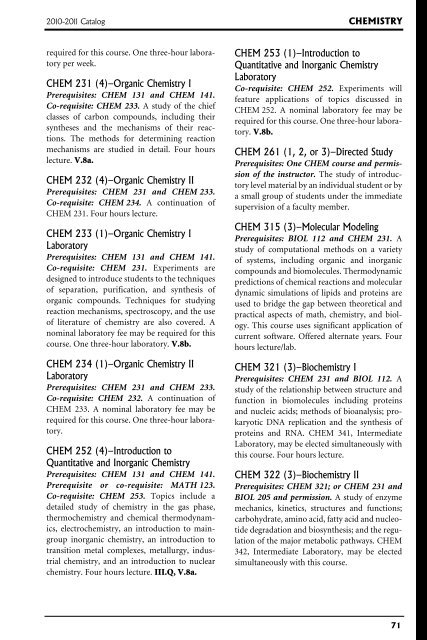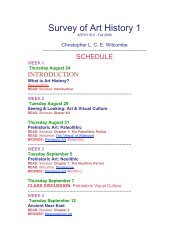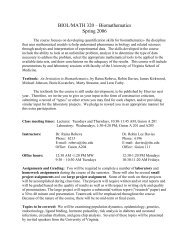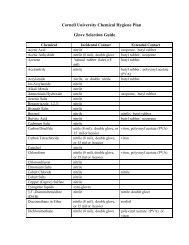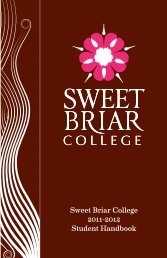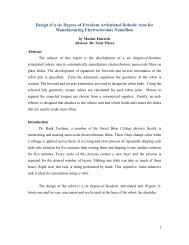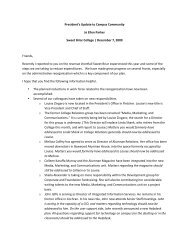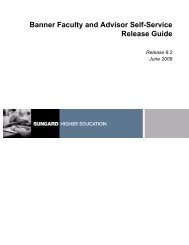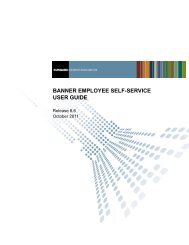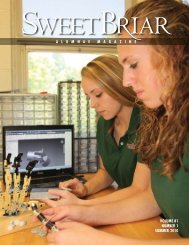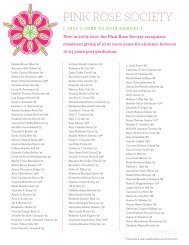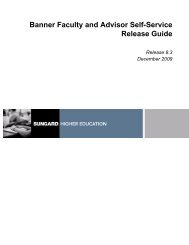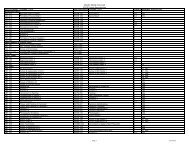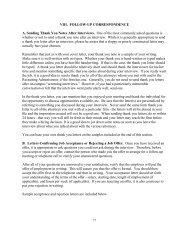chemistry<strong>Sweet</strong> <strong>Briar</strong> <strong>College</strong>Course DescriptionsCHEM 119 (3)–The Development ofModern ScienceWhat is science and how did it arise? Why didthe scientific revolution occur in the seventeenthcentury? Who were the key players and whatstimulated their technological inventiveness?How does scientific thinking differ from conventionalhuman thought? We will explore possibleanswers to these questions. Students willbe introduced to the individuals and conceptscentral to the development of modern science.Finally, the class will explore directions whichscience is taking today. V.1, V.8a.CHEM 120 (3)–Chemistry for the Liberal Arts IA topical approach to modern chemistry. Areasof emphasis include environmental chemistry,biochemistry, medicinal chemistry, drugs, andnutrition. Three hours lecture and discussion.III.Q, V.8a.CHEM 125 (1)–Chemistry for the LiberalArts Laboratory IPrerequisite or co-requisite: CHEM 120. Anintroduction to experimental chemistry toaccompany CHEM 120. The focus of the lab is toreinforce concepts in a hands-on way using labsthat apply to everyday life (soaps, foods, breath,water quality, plastics, etc.) The lab is closely tiedto the textbook for the class. A nominal lab feemay be required for this course. V.8b.CHEM 131 (4)–General ChemistryPrerequisite: Placement or permission; orCHEM 120. Prerequisite or co-requisite: CHEM141. This course is an introduction to chemicalprinciples and it is open to students havingappropriate backgrounds in science and mathematics.Areas of emphasis include chemicalequations and reactions, stoichiometry, kinetics,chemical equilibrium, acids and bases, solubilityequilibria, electronic structure of atoms,periodic relationships, molecular structure andbonding, intermolecular forces, properties ofsolutions, and an introduction to organic chemistry.Applications of modern chemistry are discussedwhenever appropriate and are exploredin the associated laboratory course, CHEM 141.Four hours lecture and discussion. III.Q, V.8a.CHEM 141 (1)–General ChemistryLaboratoryPrerequisite or co-requisite: CHEM 131.An introduction to experimental chemistry.Laboratory modules emphasize investigationof the chemistry in everyday life and introducemodern analytical techniques. A nominal lab feemay be required for this course. One three-hourlaboratory. V.8b.CHEM 202 (3)–The Biochemistry ofHuman NutritionPrerequisite: CHEM 131 or equivalent withpermission. A study of the biochemistry ofhuman nutrition. Topics covered will includeproteins, fats, carbohydrates, vitamins, minerals,cholesterol, lipoproteins and fiber. Metabolismwill be introduced as a chemical concept as wellas an introduction to proteolytic and regulatoryenzymes. Popular controversies in nutrition willalso be explored, including food additives, vitaminand mineral supplementation and geneticengineering of foods. Offered alternate years.III.W, V.8a.CHEM 216 (3)–Analytical ChemistryPrerequisites: CHEM 131 and CHEM 141, orany 200-level chemistry course. Co-requisite:Students are strongly encouraged to takeCHEM 226. An introduction to the principles ofanalytical chemistry stressing proper methods ofobtaining and handling data. Topics include statisticalerror analysis, propagation of error, methodsof data reduction, sampling techniques, samplepreparation, method validation, sample interferences,and complex equilibria. The course alsoexplores classical analytical techniques and surveysmethods using advanced instrumentation.CHEM 226 (1)–Environmental AnalyticalChemistry LaboratoryPrerequisite: CHEM 131. Co-requisite: CHEM216 or ENVR 244. Students will gain practicalexperience analyzing samples from diversematrices including sediment, air, soil, and water.Students will also learn how to critically analyzedata, conduct an error analysis, and recommendimprovements to an experimental procedure.Methods of analysis include gravimetric, titrimetric,UV/Vis spectrophotometry, fluorometry,AAS, and HPLC. A nominal lab fee may be70
<strong>2010</strong>-<strong>2011</strong> Catalog chemistryrequired for this course. One three-hour laboratoryper week.CHEM 231 (4)–Organic Chemistry IPrerequisites: CHEM 131 and CHEM 141.Co-requisite: CHEM 233. A study of the chiefclasses of carbon compounds, including theirsyntheses and the mechanisms of their reactions.The methods for determining reactionmechanisms are studied in detail. Four hourslecture. V.8a.CHEM 232 (4)–Organic Chemistry IIPrerequisites: CHEM 231 and CHEM 233.Co-requisite: CHEM 234. A continuation ofCHEM 231. Four hours lecture.CHEM 233 (1)–Organic Chemistry ILaboratoryPrerequisites: CHEM 131 and CHEM 141.Co-requisite: CHEM 231. Experiments aredesigned to introduce students to the techniquesof separation, purification, and synthesis oforganic compounds. Techniques for studyingreaction mechanisms, spectroscopy, and the useof literature of chemistry are also covered. Anominal laboratory fee may be required for thiscourse. One three-hour laboratory. V.8b.CHEM 234 (1)–Organic Chemistry IILaboratoryPrerequisites: CHEM 231 and CHEM 233.Co-requisite: CHEM 232. A continuation ofCHEM 233. A nominal laboratory fee may berequired for this course. One three-hour laboratory.CHEM 252 (4)–Introduction toQuantitative and Inorganic ChemistryPrerequisites: CHEM 131 and CHEM 141.Prerequisite or co-requisite: MATH 123.Co-requisite: CHEM 253. Topics include adetailed study of chemistry in the gas phase,thermochemistry and chemical thermodynamics,electrochemistry, an introduction to maingroupinorganic chemistry, an introduction totransition metal complexes, metallurgy, industrialchemistry, and an introduction to nuclearchemistry. Four hours lecture. III.Q, V.8a.CHEM 253 (1)–Introduction toQuantitative and Inorganic ChemistryLaboratoryCo-requisite: CHEM 252. Experiments willfeature applications of topics discussed inCHEM 252. A nominal laboratory fee may berequired for this course. One three-hour laboratory.V.8b.CHEM 261 (1, 2, or 3)–Directed StudyPrerequisites: One CHEM course and permissionof the instructor. The study of introductorylevel material by an individual student or bya small group of students under the immediatesupervision of a faculty member.CHEM 315 (3)–Molecular ModelingPrerequisites: BIOL 112 and CHEM 231. Astudy of computational methods on a varietyof systems, including organic and inorganiccompounds and biomolecules. Thermodynamicpredictions of chemical reactions and moleculardynamic simulations of lipids and proteins areused to bridge the gap between theoretical andpractical aspects of math, chemistry, and biology.This course uses significant application ofcurrent software. Offered alternate years. Fourhours lecture/lab.CHEM 321 (3)–Biochemistry IPrerequisites: CHEM 231 and BIOL 112. Astudy of the relationship between structure andfunction in biomolecules including proteinsand nucleic acids; methods of bioanalysis; prokaryoticDNA replication and the synthesis ofproteins and RNA. CHEM 341, IntermediateLaboratory, may be elected simultaneously withthis course. Four hours lecture.CHEM 322 (3)–Biochemistry IIPrerequisites: CHEM 321; or CHEM 231 andBIOL 205 and permission. A study of enzymemechanics, kinetics, structures and functions;carbohydrate, amino acid, fatty acid and nucleotidedegradation and biosynthesis; and the regulationof the major metabolic pathways. CHEM342, Intermediate Laboratory, may be electedsimultaneously with this course.71
- Page 1:
S w e e t B r i a r CollegeCatalog
- Page 6:
A Brief HistorySweet Briar Collegei
- Page 14 and 15:
academic scholarshipsVirginia resid
- Page 17 and 18:
2010-2011 Catalog student lifephysi
- Page 19 and 20:
2010-2011 Catalog student lifeColle
- Page 21 and 22: 2010-2011 Catalog college feesThis
- Page 24 and 25: general policiesSweet Briar College
- Page 26 and 27: general policiesSweet Briar College
- Page 28 and 29: academic programsSweet Briar Colleg
- Page 30 and 31: academic programsSweet Briar Colleg
- Page 32 and 33: academic programsSweet Briar Colleg
- Page 34 and 35: academic programsSweet Briar Colleg
- Page 36 and 37: academic regulationsAcademicRegulat
- Page 38 and 39: academic regulationsSweet Briar Col
- Page 40 and 41: equirements for the degreeSweet Bri
- Page 42 and 43: equirements for the degreeSweet Bri
- Page 44 and 45: equirements for the degreeSweet Bri
- Page 46 and 47: equirements for the degreeSweet Bri
- Page 48 and 49: Courses of instructionSweet Briar C
- Page 50 and 51: Anthropology and ArchaeologySweet B
- Page 52 and 53: Anthropology and ArchaeologySweet B
- Page 54 and 55: Anthropology and ArchaeologySweet B
- Page 56 and 57: arts ManagementSweet Briar CollegeA
- Page 58 and 59: BiologyBiologyModern biology has ev
- Page 60 and 61: BiologySweet Briar CollegeBIOL 104
- Page 62 and 63: iologySweet Briar Collegeogy, anato
- Page 64 and 65: BusinessBusinessThe mission of the
- Page 66 and 67: BusinessSweet Briar Collegefunction
- Page 68 and 69: BusinessSweet Briar Collegeincludin
- Page 70 and 71: ChemistrySweet Briar Collegelaborat
- Page 74 and 75: chemistrySweet Briar CollegeCHEM 33
- Page 76 and 77: classics, philosophy, and religionS
- Page 78 and 79: classics, philosophy, and religionS
- Page 80 and 81: classics, philosophy, and religionS
- Page 82 and 83: classics, philosophy, and religionS
- Page 84 and 85: classics, philosophy, and religionS
- Page 86 and 87: classics, philosophy, and religionS
- Page 88 and 89: economicsSweet Briar CollegeECON 10
- Page 90 and 91: educationSweet Briar CollegeThrough
- Page 92 and 93: educationSweet Briar CollegeEDUC 22
- Page 94 and 95: englishSweet Briar Collegeable outc
- Page 96 and 97: englishSweet Briar Collegeare encou
- Page 98 and 99: englishSweet Briar CollegeStudents
- Page 100 and 101: englishSweet Briar CollegeENGL 110
- Page 102 and 103: englishSweet Briar CollegeENGL 218
- Page 104 and 105: englishSweet Briar Collegesized. Pl
- Page 106 and 107: EnglishSweet Briar CollegeENGL 397
- Page 108 and 109: EnglishSweet Briar Collegeand op-ed
- Page 110 and 111: environmental studiesSweet Briar Co
- Page 112 and 113: environmental studiesSweet Briar Co
- Page 114 and 115: equine studiesSweet Briar CollegeEN
- Page 116 and 117: gender studiesSweet Briar Collegeas
- Page 118 and 119: government and international affair
- Page 120 and 121: government and international affair
- Page 122 and 123:
government and international affair
- Page 124 and 125:
historySweet Briar Collegewhich cou
- Page 126 and 127:
historySweet Briar CollegeHIST 144
- Page 128 and 129:
historySweet Briar CollegeHIST 272
- Page 130 and 131:
HistorySweet Briar Collegears, and
- Page 132 and 133:
History of artSweet Briar Collegeth
- Page 134 and 135:
History of artart theory in the 15t
- Page 136 and 137:
honors programSweet Briar Collegeon
- Page 138 and 139:
Interdisciplinary studiesSweet Bria
- Page 140 and 141:
latin American studiesSweet Briar C
- Page 142 and 143:
law and societySweet Briar CollegeC
- Page 144 and 145:
Mathematical and computer sciencesS
- Page 146 and 147:
Mathematical and computer sciencesS
- Page 148 and 149:
mathematical economicsSweet Briar C
- Page 150 and 151:
modern languages and literaturesSwe
- Page 152 and 153:
modern languages and literaturesSwe
- Page 154 and 155:
modern languages and literaturesSwe
- Page 156 and 157:
modern languages and literaturesSwe
- Page 158 and 159:
modern languages and literaturesSwe
- Page 160 and 161:
modern languages and literaturesSwe
- Page 162 and 163:
modern languages and literaturesSwe
- Page 164 and 165:
musicSweet Briar CollegeCourse Desc
- Page 166 and 167:
musicSweet Briar CollegeMUSC 245 (1
- Page 168 and 169:
physical education, athletics, and
- Page 170 and 171:
physical education, athletics, and
- Page 172 and 173:
physics and engineeringSweet Briar
- Page 174 and 175:
physics and engineeringSweet Briar
- Page 176 and 177:
physics and engineeringSweet Briar
- Page 178 and 179:
physics and engineeringSweet Briar
- Page 180 and 181:
psychologySweet Briar CollegeThe Ps
- Page 182 and 183:
psychologySweet Briar CollegePSYC 3
- Page 184 and 185:
iding programReligionSee the Depart
- Page 186 and 187:
iding programSweet Briar CollegeRDP
- Page 188 and 189:
sociologySweet Briar CollegeNote: F
- Page 190 and 191:
sociologySOCI 450 (3)-Sociological
- Page 192 and 193:
studio artSweet Briar CollegeARTS 1
- Page 194 and 195:
studio artSweet Briar Collegetorica
- Page 196 and 197:
theatre and danceSweet Briar Colleg
- Page 198 and 199:
theatre and danceSweet Briar Colleg
- Page 200 and 201:
theatre and danceSweet Briar Colleg
- Page 202 and 203:
theatre and danceSweet Briar Colleg
- Page 204 and 205:
Academic honorsSweet Briar Collegeo
- Page 206 and 207:
Academic HonorsSweet Briar CollegeT
- Page 208 and 209:
facultySweet Briar CollegeGraduate
- Page 210 and 211:
FacultySweet Briar CollegeLinda S.
- Page 212 and 213:
FacultySweet Briar CollegeRebecca M
- Page 214 and 215:
FacultySweet Briar CollegeEmeritiGr
- Page 216 and 217:
Board of DirectorsSally Old Kitchin
- Page 218 and 219:
AdministrationSweet Briar CollegeOf
- Page 220 and 221:
indexSweet Briar CollegeFFaculty, 2
- Page 222 and 223:
Communications with the CollegeAdmi


